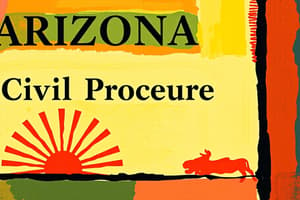Podcast
Questions and Answers
Legal contentions must present a nonfrivolous argument for modifying, reversing, or creating new ____.
Legal contentions must present a nonfrivolous argument for modifying, reversing, or creating new ____.
law
In Hunter v. Earthgrains Co. Bakery, the argument must have no chance of ____.
In Hunter v. Earthgrains Co. Bakery, the argument must have no chance of ____.
success
The goal of Rule 11 is to correct litigation abuse and balance the need for curtailing abuse with the need to encourage creativity and ____ in the law.
The goal of Rule 11 is to correct litigation abuse and balance the need for curtailing abuse with the need to encourage creativity and ____ in the law.
vitality
If a party seeks sanctions under Rule 11, they must file a separate motion on the opposing party, not the ____.
If a party seeks sanctions under Rule 11, they must file a separate motion on the opposing party, not the ____.
The Safe Harbor Period allows a party to withdraw or correct a claim within ____ days before sanctions are filed.
The Safe Harbor Period allows a party to withdraw or correct a claim within ____ days before sanctions are filed.
A defendant must serve an answer within 21 days after being ____.
A defendant must serve an answer within 21 days after being ____.
Under Rule 12(b), lack of subject matter ____ is one of the defenses that can be asserted by motion.
Under Rule 12(b), lack of subject matter ____ is one of the defenses that can be asserted by motion.
If a court denies a motion, the responsive pleading must be served within ____ days after notice of the court's action.
If a court denies a motion, the responsive pleading must be served within ____ days after notice of the court's action.
Bell Atlantic claims requires more than labels and conclusions and a formulaic recitation of the ______.
Bell Atlantic claims requires more than labels and conclusions and a formulaic recitation of the ______.
Legal conclusions that presuppose the truth of the claim by restating the legal cause of ______ are identified in the Iqbal Two-Step Test.
Legal conclusions that presuppose the truth of the claim by restating the legal cause of ______ are identified in the Iqbal Two-Step Test.
Mere recitations of the elements do not provide factual material to connect the legal claim with the ______.
Mere recitations of the elements do not provide factual material to connect the legal claim with the ______.
Naked assertions devoid of further factual ______ are too vague to be sufficiently tangible or verifiable.
Naked assertions devoid of further factual ______ are too vague to be sufficiently tangible or verifiable.
Plausibility compares the conclusory allegations with the well-pleaded ______ to determine if the plaintiff's desired conclusion is plausible.
Plausibility compares the conclusory allegations with the well-pleaded ______ to determine if the plaintiff's desired conclusion is plausible.
Addressing alternative explanations must be so obvious as to foreclose the plausibility of the plaintiff's desired ______.
Addressing alternative explanations must be so obvious as to foreclose the plausibility of the plaintiff's desired ______.
In responding to a pleading, a party must state in short and plain terms its ______ to each claim asserted against it.
In responding to a pleading, a party must state in short and plain terms its ______ to each claim asserted against it.
Negative defenses seek to disprove an element of ______ claim.
Negative defenses seek to disprove an element of ______ claim.
A domicile refers to a true, fixed, and permanent home to which you have intention of returning whenever absent therefrom, and it requires ______ in a different state.
A domicile refers to a true, fixed, and permanent home to which you have intention of returning whenever absent therefrom, and it requires ______ in a different state.
To change domicile, there must be a combination of taking up residence in a different state and having the intent to remain there ______.
To change domicile, there must be a combination of taking up residence in a different state and having the intent to remain there ______.
In order for diversity to be complete, no plaintiff may be a citizen of the same state as any ______.
In order for diversity to be complete, no plaintiff may be a citizen of the same state as any ______.
Federal courts are characterized by having ______ jurisdiction, meaning they can only hear certain types of cases.
Federal courts are characterized by having ______ jurisdiction, meaning they can only hear certain types of cases.
The well-pleaded complaint rule states that federal question jurisdiction is appropriate only if the source of the plaintiff's enforceable legal right is ______.
The well-pleaded complaint rule states that federal question jurisdiction is appropriate only if the source of the plaintiff's enforceable legal right is ______.
Only if Congress specifies that a claim must be brought in federal court will there be an exclusive federal court ______.
Only if Congress specifies that a claim must be brought in federal court will there be an exclusive federal court ______.
A suit arises under federal law only when the plaintiff's statement of cause of action shows that it is based upon those ______.
A suit arises under federal law only when the plaintiff's statement of cause of action shows that it is based upon those ______.
State courts can typically entertain almost any claim arising under common law or ______ statutory law.
State courts can typically entertain almost any claim arising under common law or ______ statutory law.
Parties' relative access to relevant ______
Parties' relative access to relevant ______
The importance of ______ in resolving those issues
The importance of ______ in resolving those issues
The burden or the expense of proposed discovery should outweigh likely ______
The burden or the expense of proposed discovery should outweigh likely ______
In Lawson v. Spirit Aerosystems, the standard is still ______ burden or expense.
In Lawson v. Spirit Aerosystems, the standard is still ______ burden or expense.
Court found that fee shifting is not appropriate due to the amount in ______
Court found that fee shifting is not appropriate due to the amount in ______
Discovery is equally available, indicating no information ______
Discovery is equally available, indicating no information ______
Parties' resources are a neutral ______ in evaluating discovery requests.
Parties' resources are a neutral ______ in evaluating discovery requests.
Factors that increased the burdens of the ______ included the volume of data to be examined.
Factors that increased the burdens of the ______ included the volume of data to be examined.
A party may serve on any other party no more than ______ written interrogatories.
A party may serve on any other party no more than ______ written interrogatories.
You have ______ days to respond to an interrogatory.
You have ______ days to respond to an interrogatory.
Requests for Production follow interrogatories and involve asking for ______ in the responding party's possession.
Requests for Production follow interrogatories and involve asking for ______ in the responding party's possession.
The request must describe with ______ each item or category of items to be inspected.
The request must describe with ______ each item or category of items to be inspected.
A party may request to ______ on designated land so that they can inspect or measure it.
A party may request to ______ on designated land so that they can inspect or measure it.
Requests for production allow inspection, copying, testing, or ______ of items in the responding party's control.
Requests for production allow inspection, copying, testing, or ______ of items in the responding party's control.
Interrogatories may relate to any matter that may be inquired into under Rule ______.
Interrogatories may relate to any matter that may be inquired into under Rule ______.
Electronically stored information must be produced in a ______ useful form if necessary.
Electronically stored information must be produced in a ______ useful form if necessary.
No genuine dispute occurs when there is no reasonable jury that could draw the nonmovant's desired ____.
No genuine dispute occurs when there is no reasonable jury that could draw the nonmovant's desired ____.
In Matsushita Electric Indus Co v. Zenith, parties must do more than show that there is metaphysical ____ to the material facts.
In Matsushita Electric Indus Co v. Zenith, parties must do more than show that there is metaphysical ____ to the material facts.
In Anderson v. Liberty Lobby, summary judgment is appropriate if there can be but one reasonable ____.
In Anderson v. Liberty Lobby, summary judgment is appropriate if there can be but one reasonable ____.
In Bias v. Advantage International, the evidence presented by the teammates needed to be compared against his past drug ____.
In Bias v. Advantage International, the evidence presented by the teammates needed to be compared against his past drug ____.
Generalized evidence by the plaintiff was deemed insufficient to contradict specific ____.
Generalized evidence by the plaintiff was deemed insufficient to contradict specific ____.
In the case of Scott v. Harris, Scott is immune from suit if Harris posed a sufficient threat of physical ____ to others.
In the case of Scott v. Harris, Scott is immune from suit if Harris posed a sufficient threat of physical ____ to others.
In assessing inferences that may be reasonable, it must be done within the specific context of the ____.
In assessing inferences that may be reasonable, it must be done within the specific context of the ____.
In Adickes v. SH Kress & Co, the jury had to consider whether there was a conspiracy between the store owner and the ____.
In Adickes v. SH Kress & Co, the jury had to consider whether there was a conspiracy between the store owner and the ____.
Flashcards
Rule 11(b) Violations
Rule 11(b) Violations
A legal filing that is not supported by law or fact and filed for an improper purpose.
Safe Harbor Period
Safe Harbor Period
A period of 21 days after service where a challenged claim can be withdrawn or corrected without facing sanctions.
Rule 11 Sanctions
Rule 11 Sanctions
Court penalties for violating Rule 11(b), designed to deter future misconduct, by paying penalties, attorney's fees, or non-monetary directions.
Hunter v. Earthgrains Co. Bakery
Hunter v. Earthgrains Co. Bakery
Signup and view all the flashcards
Time to Respond (Defendant)
Time to Respond (Defendant)
Signup and view all the flashcards
Responsive Pleading
Responsive Pleading
Signup and view all the flashcards
Subject Matter Jurisdiction
Subject Matter Jurisdiction
Signup and view all the flashcards
Gaiardo v. Ethyl Corp
Gaiardo v. Ethyl Corp
Signup and view all the flashcards
Bell Atlantic Standard
Bell Atlantic Standard
Signup and view all the flashcards
Iqbal Two-Step Test
Iqbal Two-Step Test
Signup and view all the flashcards
Conclusory Allegations
Conclusory Allegations
Signup and view all the flashcards
Plausibility Standard
Plausibility Standard
Signup and view all the flashcards
Mere Recitations of Elements
Mere Recitations of Elements
Signup and view all the flashcards
Naked Assertions
Naked Assertions
Signup and view all the flashcards
Negative Defenses
Negative Defenses
Signup and view all the flashcards
Answer (Rule 8(b))
Answer (Rule 8(b))
Signup and view all the flashcards
Parties' Relative Access to Information
Parties' Relative Access to Information
Signup and view all the flashcards
Parties' Resources
Parties' Resources
Signup and view all the flashcards
Importance of Discovery
Importance of Discovery
Signup and view all the flashcards
Burden/Expense vs. Benefit of Discovery
Burden/Expense vs. Benefit of Discovery
Signup and view all the flashcards
Lawson v. Spirit Aerosystems
Lawson v. Spirit Aerosystems
Signup and view all the flashcards
Undue Burden/Expense
Undue Burden/Expense
Signup and view all the flashcards
Fishing Expeditions
Fishing Expeditions
Signup and view all the flashcards
Rule 26(b)(2)(C)
Rule 26(b)(2)(C)
Signup and view all the flashcards
Domicile
Domicile
Signup and view all the flashcards
Change of Domicile
Change of Domicile
Signup and view all the flashcards
Complete Diversity (Strawbridge v. Curtiss)
Complete Diversity (Strawbridge v. Curtiss)
Signup and view all the flashcards
Federal Question Jurisdiction
Federal Question Jurisdiction
Signup and view all the flashcards
Well-Pleaded Complaint Rule
Well-Pleaded Complaint Rule
Signup and view all the flashcards
Removal Jurisdiction (28 USC 1441)
Removal Jurisdiction (28 USC 1441)
Signup and view all the flashcards
Limited SMJx of Fed Courts
Limited SMJx of Fed Courts
Signup and view all the flashcards
Exclusive Federal JX
Exclusive Federal JX
Signup and view all the flashcards
Interrogatories Limit
Interrogatories Limit
Signup and view all the flashcards
Interrogatory Scope
Interrogatory Scope
Signup and view all the flashcards
Interrogatory Response Time
Interrogatory Response Time
Signup and view all the flashcards
Requests for Production
Requests for Production
Signup and view all the flashcards
Electronic Storage Inspection
Electronic Storage Inspection
Signup and view all the flashcards
Tangible Things Request
Tangible Things Request
Signup and view all the flashcards
Land Inspection Request
Land Inspection Request
Signup and view all the flashcards
Production Request Detail
Production Request Detail
Signup and view all the flashcards
Summary Judgment Standard
Summary Judgment Standard
Signup and view all the flashcards
Matsushita Standard
Matsushita Standard
Signup and view all the flashcards
Anderson v. Liberty Lobby
Anderson v. Liberty Lobby
Signup and view all the flashcards
Bias v. Advantage International
Bias v. Advantage International
Signup and view all the flashcards
Scott v. Harris
Scott v. Harris
Signup and view all the flashcards
Tolan v. Cotton
Tolan v. Cotton
Signup and view all the flashcards
Rule 56 Procedure
Rule 56 Procedure
Signup and view all the flashcards
Adickes v. SH Kress & Co.
Adickes v. SH Kress & Co.
Signup and view all the flashcards
Study Notes
Introduction
- Title 28: US Code § 2072; Rules of Procedure and Evidence govern procedural issues for trial judges.
- Rules Enabling Act of 1934 established the Supreme Court's role in disseminating rules for practice and procedure.
- Rule 1 governs procedure in all US District Court civil actions and proceedings, aiming for just, speedy, and inexpensive resolutions.
- Amendments V and XIV of the US Constitution protect individuals from deprivation of life, liberty, or property without due process, limiting state power.
- Amendment X reserves powers not delegated to the federal government to the states.
- Goals of Civil Procedure: accuracy, efficiency, impartiality, and finality, with emphasis on outcomes rather than process.
The Pleadings
- Code Pleading Era (1848 -?): Common law pleadings were replaced by individualized code pleading standards.
- Pre-1848: Common law pleadings were essential forms of action, and similar language is used per Rule 8.
- Rule 8 requires a short and plain statement of the grounds for jurisdiction, entitlement to relief, and the relief demanded, for fair notice to defendant (and court).
- Rule 9 adds specificity for fraud claims (e.g., specific dates, times, locations).
Rule 10, Rule 11
- Rule 10 specifies the format of pleadings (e.g., clarity, conciseness).
- Rule 11 provides sanctions against frivolous pleadings, or for making claims unsupported by facts.
Rules 8 and 9
- Rule 8: Specificity about the claim/grounds on which the claim rests; "short and plain statement".
- Rule 9: Specificity about claims of fraud (e.g., details).
Rule 12(b)
- Rule 12(b): defenses and objections to a claim for relief may be raised by motion.
- Examples of such defenses: lack of subject matter jurisdiction, lack of personal jurisdiction, improper venue, insufficient process/service of process, failure to state a claim upon which relief can be granted, and failure to join a necessary party.
Rule 15: Amending Pleadings
- Amending pleadings as a matter of course is permitted within specific timeframes.
- Leave of court is required for other amendments.
- Reasons for granting leave to amend may include undue delay, bad faith, undue prejudice to opposing party, or futility of the proposed amendment.
Rule 12(b)(6): Failure to State a Claim
- This motion challenges if, even if all facts were true, the complaint fails to state a claim that entitles the plaintiff to relief.
- Courts take the facts as true but do not take as true conclusions that those facts imply.
Rule 12(b)(1): Lack of Subject-Matter Jurisdiction
- This challenge attacks the court's power to hear the type of case.
- Example: Incorrect jurisdiction (e.g., case that should be in state court is brought in federal court)
Rule 12, Rule 11, Rule 12(b)1, 12/(b)6.
- Rule 12 (b)(6) or (b)(1) motions are about the sufficiency of the complaint.
- Rulings by the judge may include granting some of the motion, denying some, and dismissing.
Rule 8(a)(2), Rule 9
- Requires a "Short and Plain Statement", the pleading that enables the claim for consideration in court.
- Additional specificity may be required for situations such as fraud.
Jurisdiction
- Diversity jurisdiction requires complete diversity between parties, meaning no plaintiff and defendant share the same state of citizenship (see 28 U.S.C. § 1332).
- Federal courts have limited jurisdiction.
- Sufficient minimum contacts with the forum state are necessary for personal jurisdiction over a party.
Discovery
- Purpose: facilitate a fair trial, narrow the issues, and prevent trial surprises.
- Requests can be made for documents, tangible things, and interrogatories.
Rule 26(b)(1) and 26(b)(2): Limitations
- Courts must balance the need for discovery against its cost and burden.
- Rule (b)(2) specifies that discovery requests must be relevant to the case.
- Courts have the capacity to deny discovery requests.
Judgment as a Matter of Law, Summary Judgment, Trial, Judgment
- Judgment as matter of law/summary judgment may be granted to avoid a trial.
- Judge decides if there's no genuine dispute of material fact and the move requesting the judgment is entitled to judgment as a matter of law.
- Trial and Judgement are the final verdict.
Appellate Review, Exceptions, Phases of Trial
- Appellate courts review lower court decisions for errors of law.
- Exceptions to rulings can be challenged.
- Trial phases, beginning with pleadings and conclusion, can be appealed.
Studying That Suits You
Use AI to generate personalized quizzes and flashcards to suit your learning preferences.




